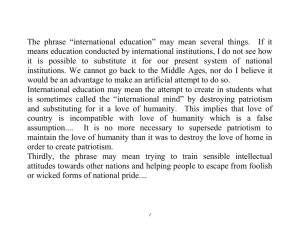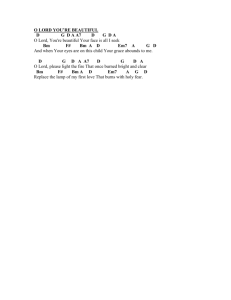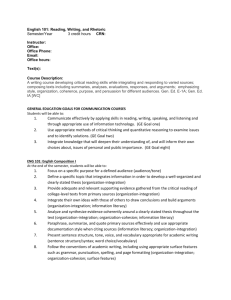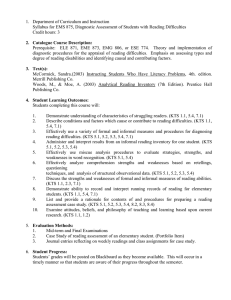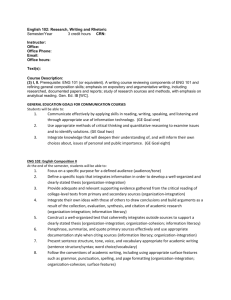EDF 837, Comparative Education
advertisement
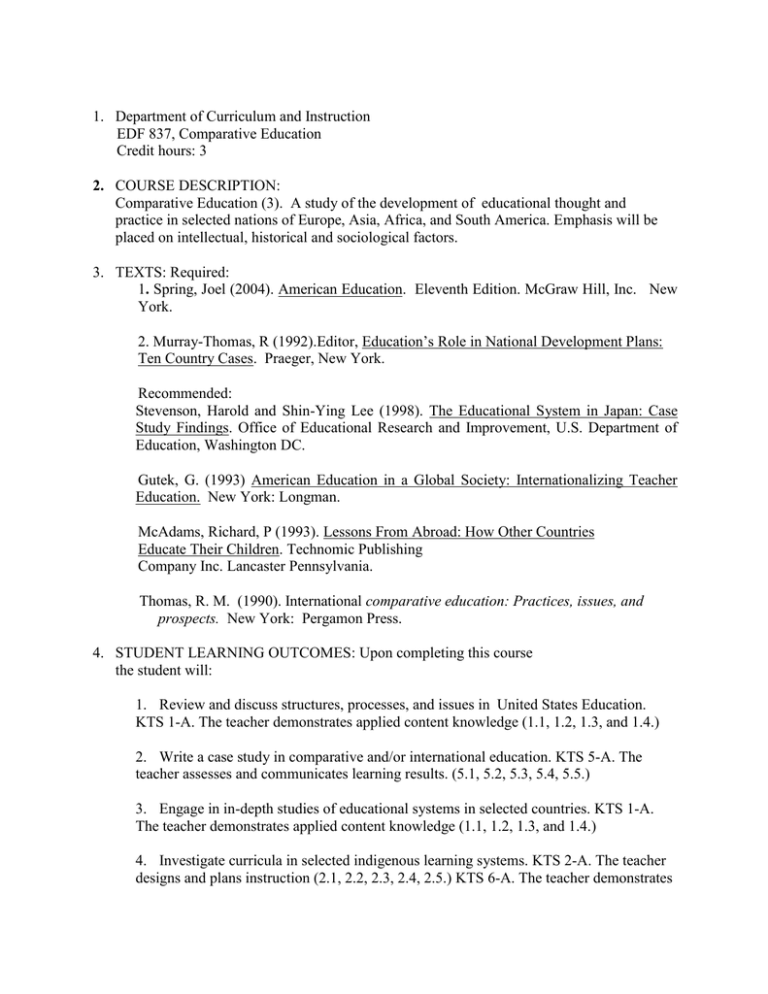
1. Department of Curriculum and Instruction EDF 837, Comparative Education Credit hours: 3 2. COURSE DESCRIPTION: Comparative Education (3). A study of the development of educational thought and practice in selected nations of Europe, Asia, Africa, and South America. Emphasis will be placed on intellectual, historical and sociological factors. 3. TEXTS: Required: 1. Spring, Joel (2004). American Education. Eleventh Edition. McGraw Hill, Inc. New York. 2. Murray-Thomas, R (1992).Editor, Education’s Role in National Development Plans: Ten Country Cases. Praeger, New York. Recommended: Stevenson, Harold and Shin-Ying Lee (1998). The Educational System in Japan: Case Study Findings. Office of Educational Research and Improvement, U.S. Department of Education, Washington DC. Gutek, G. (1993) American Education in a Global Society: Internationalizing Teacher Education. New York: Longman. McAdams, Richard, P (1993). Lessons From Abroad: How Other Countries Educate Their Children. Technomic Publishing Company Inc. Lancaster Pennsylvania. Thomas, R. M. (1990). International comparative education: Practices, issues, and prospects. New York: Pergamon Press. 4. STUDENT LEARNING OUTCOMES: Upon completing this course the student will: 1. Review and discuss structures, processes, and issues in United States Education. KTS 1-A. The teacher demonstrates applied content knowledge (1.1, 1.2, 1.3, and 1.4.) 2. Write a case study in comparative and/or international education. KTS 5-A. The teacher assesses and communicates learning results. (5.1, 5.2, 5.3, 5.4, 5.5.) 3. Engage in in-depth studies of educational systems in selected countries. KTS 1-A. The teacher demonstrates applied content knowledge (1.1, 1.2, 1.3, and 1.4.) 4. Investigate curricula in selected indigenous learning systems. KTS 2-A. The teacher designs and plans instruction (2.1, 2.2, 2.3, 2.4, 2.5.) KTS 6-A. The teacher demonstrates the implementation of technology. (6.1, 6.2, 6.3, 6.4, 6.5.) 5. Critique two articles published in a journal of Comparative/international education. KTS 1-A. The teacher demonstrates applied content knowledge (1.1, 1.2, 1.3, and 1.4.) KTS 6A. The teacher demonstrates the implementation of technology. (6.1, 6.2, 6.3, 6.4, 6.5.) KTS 7-A. The teacher reflects on and evaluates teaching and learning. (7-1, 7-2, 7-3.) 6. Write a book report on a relevant topic in comparative or international education. KTS 7A. The teacher reflects on and evaluates teaching and learning. (7-1, 7-2, 7-3.) 5. EVALUATION METHODS: Item 1. Case Study 2. Two reflections from Education’s Role in ...” 3. Two Journal Article Critiques 4. Book Report 5. Online discussion participation Points 30 20 20 20 10 GRADING SCALE: A B C D F 100 - 90 89 - 80 79 - 70 69 - 60 59 - 0 6. Student Progress The instructor will provide students with written information on their progress in the course at least once prior to the mid-point of the course. Grades will be maintained in the course Blackboard site. 7. Attendance Policy Attendance is required on all campus meetings. Regular activity class is also electronically registered on Blackboard. General attendance will also be recognized with regard to participation in the class online discussion board and in group discussion boards when relevant. Students who do not have legitimate reasons for irregular activity online will lose 10% of total class points. 8. Last Day To Drop the Course – See announcement in Colonels’ Compass 9. Disability Statement: If you are registered with the Office of Services for Individuals with Disabilities, please make an appointment with the course instructor to discuss any academic accommodations you need. If you need academic accommodations and are not registered with the Office of Services for Individuals with Disabilities, please contact the Office on the third floor of the Student Services Building, by email at disserv@eku.edu or by telephone at (859) 622-2933 V/TDD. Upon individual request, this syllabus can be made available in alternative forms. 10. Academic Integrity Statement: EKU’s Academic Integrity policy will strictly be enforced in this course. The Academic Integrity policy is available at www.academicintegrity.eku.edu. Questions regarding the policy may be directed to the Office of Academic Integrity. 11. COURSE REQUIREMENTS: This course is offered in the EKU Blackboard website. It is indispensable to have access to a Pentium 1 or higher computer or laptop. Class discussions in the virtual classroom led by the instructor may be scheduled from 6:00 p.m to 8:00. p.m on selected evenings for the first eight weeks of the course. Individual group discussions may be conducted on the discussion board for the following seven weeks. Class discussions with the instructor will be ongoing in the general class discussion board. At the end of the course students will: a. Organize and present a portfolio of written class work and/or graphic items on selected syllabus items. b. Regularly participate in the online general class discussion board. c. Complete two critiques of articles published in journals of comparative /international education. Each critique must be at least 10 pages in length, double–spaced in APA style. Save your critiques in one file and submit in Blackboard as one attachment. d. Submit two reflections on selected readings in comparative education. Three - pages double – spaced including references. Save your reflections in one file and submit in Blackboard as one attachment e. Present a case study on a specific topic of education in United States and another country, or, a comparative study of two different topics or countries. About 30-40 pages, typewritten and double-spaced in APA style. All topics must be approved by the instructor. 12. COURSE OUTLINE TOPIC Week 1. Introductions. Overview of Syllabus. Week 2. CONTENT *Introductions *Paper Clips and Safety Pins. Making Comparisons. Contexts and their use. *Hinton (1999) "Antecedents And Precedents in Comparative Education Education in a Changing World: Defining Note Campus Meeting Location TBA Gutek 85 - 94 Hinton - Online Gutek 3 - 56 Week 3. Week 4. Week 5 Week 6 Week 7 International Education; and The American Role in International Education Nationalism and International Security and Education; Changing Perspectives on International Development and Development Education, and Globalization and Education Nationalism, American Exceptionalism, and Enthnonationalism: Implications for Education. In addition, Educational Systems in national Contexts. Education in the United States: Context and History. Education in the United States: Administration, Organization, and Structure. Education in the United Kingdom, France, and the Russian Federation Education in Mexico, Japan, and the People's Republic of China Week 8 Education in India and Nigeria. No Midterm Examination Week 9 SPRING BREAK Week 10 Selected readings from Bibliography or Educational Websites, or Full Text Books on the Internet Selected readings from Bibliography or Educational Websites, or Full Text Books on the Internet Selected Readings Selected Readings Selected Readings Week 11 Week 12 Week 13 Week 14 Week 15 Week 16 Class Presentations, Combs 413 Week 17. There is no final examination for this class Gutek 57 - 114 Gutek 116 157. Campus Mtg. Location TBA Gutek 158 211. Gutek 212 299 Gutek. 301 386 Campus Mtg. Location TBA Gutek 389 441 Critiques Due. SPRING BREAK Reflections Due Noll. Part I Noll. Part II Noll. Part III Campus Meeting Location TBA Research Paper Due Campus Meeting Location TBA Group Project Due Univ. Final Univ. Final Examination Week Examination This tentative calendar contains basic readings. These may be supplemented by reading from other texts and online material. 13. Other Official E-mail: An official EKU e-mail is established for each registered student, faculty, and staff member. All university communications sent via e-mail will be sent to this EKU e-mail address. Course P/N EDF 837 Course Title Comparative Education RELATIONSHIP TO: College of Education Conceptual Framework K- Basic Knowledge, A- Application, PA- Portfolio Artifact, KA 1, 2, 3, 4, 5, 6- Key Assessments CF1 CF2 CF3 CF4 CF5 K,A K, A K, A K, A Kentucky Teacher Standards – Advanced K- Basic Knowledge, A- Application, PA- Portfolio Artifact, KA 1, 2, 3, 4, 5, 6- Key Assessments TS1 TS2 TS3 TS4 TS5 TS6 TS7 TS8 TS9 TS10 K, A, K K K K, A PA EKU Goals EKU-G1 X EKU–G2 EKU-G3 X EKU-G4 EKU-G5 KERA Initiatives KERA Initiatives: The course document must demonstrate the integration of the KERA initiatives if they are applicable to the program. ED LEADERSHIP WOULD ALSO ADDRESS Standards and Indicators for School Improvement (SISI) ; MUNIS, KTIP, and KPIP ; SBDM, Special ED law and ARC Identify the initiative number(s) for each category Learner Program of Program of Goals/Academic Studies: Studies: Skills & Expectations Understandings Concepts Core Content EPSB Themes K- Basic Knowledge, A- Application, PA- Portfolio Artifact, KA 1, 2, 3, 4, 5, 6- Key Assessments Code of Leadership COURSES Diversity Assessment Literacy Ethics A, K A, K SPA STANDARD NAME GOES HERE NA
